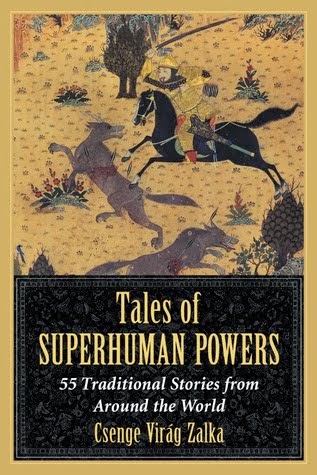This year, my A to Z Blogging Challenge theme is Romance Tropes in Folklore! For each letter, I will pick a popular trope from romcom movies and romance novels, and see if I can find the same trope in folktales and legends. Because it's fun. Here we go.
THE TROPE
Arranged Marriage in romance means a story where the protagonists are married before they fall in love (or even meet). They usually do end up falling in love, in a "slow burn" way, as they get to know each other. Forced marriage (where one party is forced into the marriage, rather than being an even match) is a subset of this trope.
(Yes, I am learning these as I go along.)
THE FOLKLORE
This one might seem like a low hanging fruit for folklore, since for centuries arranged marriage was the norm, rather than the exception. Traditional tales are teeming with princesses being doled out by their parents willy-nilly. But I was trying to aim higher, looking for stories where love and romance are an important component within the arranged marriage story.
THE STORIES
The pasha's daughter (Arab folktale)
This story begins with a pasha who has a clever and brave daughter, Uns-ul-Juloos. She refuses to marry anyone she does not love. When she rejects a very high profile suitor, her father grows furious, and decides to teach her a lesson by marrying her to the most wretched person in the city. His servants dig up a drunk, dirty and poor man, and Uns-ul-Juloos is married to him immediately. However, even when she is moved from palace to dingy hovel, she doesn't despair. She soon learns that her husband is actually a kind person, and he grows to love her so much that he puts in the effort to give her a good life. They slowly grow to love each other and build a life together. Then one day he takes a job traveling with a caravan, and encounters a jinn who grants him some magic pomegranates. With the use of the fruit, Uns-ul-Juloos and her husband become wealthy, and manage to prove to the pasha that a good relationship with a good person is much better than a rich suitor would have been.
Sultan Hasan (Egyptian folktale)
A sultan has to go into exile and live in disguise to avoid a family curse. On his travels, he encounters a man who keeps abusing his wife, divorcing and re-marrying her again and again. Eventually, by law, she has to be married to someone else before he can have her again. So they arrange for her to marry some random beggar for one day only. The beggar happens to be the sultan in disguise - and the woman decides that he is a much better husband. They refuse to divorce after the one day is up.
Mongan and Dubh-Lacha (Irish legend)
Mongan is an Irish hero born to Manannan Mac Lir, lord of the Land of Promise, and a mortal woman. The woman's husband, Fiachna the Fair, offers his wife to Manannan in exchange for the deity saving him in a battle against venomous sheep (yes, really). When the child of this one-night stand is born, Manannan takes the baby away to be raised in his world. But before that, baby Mongan is engaged to the daughter of Fiachna the Fair's co-king, Fiachna the Black. While Mongan is away, Fiachna the Balck kills Fiachna the Fair, and takes over the kingdom. When sixteen-year-old Prince Mongan returns by popular demand, he makes peace with his (foster) father's killer, and marries his daughter Dubh-Lacha (Black Duck). So, this is not only an arranged marriage, but also a political union between enemies. Mongan eventually does kill Fiachna the Black, and becomes sole king.
Despite this fact, Mongan and Dubh-Lacha prove to be a fitting couple. Later on, Mongan makes a mistake, promising his friend the King of Leinster "whatever he wishes for" in his kingdom. The king demands Dubh-Lacha, and to preserve his honor, Mongan has to give her up. However, he soon decides to use his magic powers (earned in the Land of Promise) to get her back. With his foster brother Mac An Daimh at his side (who is married to Dubh-Lacha's foster sister), he sets out, and goes through a series of tricks and adventures until he rescues his wife. And to prove that she is very happy with this development, and one point he disguises himself as a priest just to take her confession - which promptly turns into sex.
Do you have favorite romance stories that feature this trope?
Can you see these folktale versions as blurbs for novels?
Don't forget to leave a link in the comments so I can visit you back!
Happy A to Z!










